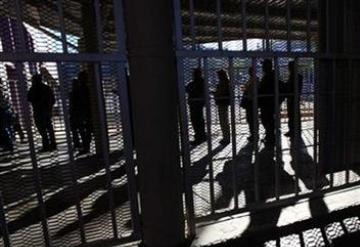
|  |  |  Americas & Beyond Americas & Beyond  
Cops Target Smugglers as Illegal Migration Slows
 Tim Gaynor - Reuters Tim Gaynor - Reuters
go to original
November 19, 2010


| | People wait in line to cross from Mexico into the U.S. at the Port of Entry in Nogales, Arizona November 11, 2010. (Reuters/Eric Thayer) |  |
Phoenix - A sharp fall in the number of illegal immigrants from Mexico is allowing police in Arizona to target the smuggling networks that funnel them into the country, authorities say.

Arizona is the principal gateway into the United States for human smugglers and marijuana traffickers from Mexico in an illicit trade worth billions of dollars a year.

Last year the U.S. Border Patrol made 241,000 arrests in the deserts in the south of the state, down from a peak of about 616,000 a decade ago, as stepped-up security and a poor economy contributed to reducing migrant flows.

The stark fall in detentions means officers from a range of police agencies spend less time booking immigrants than they did in previous years, freeing them to focus on smugglers.

"At the high-water mark for alien smuggling in Arizona, our investigators, just like our counterparts in other agencies, were very much focused on going from incident to incident to incident, and doing triage on those incidents," said Matthew Allen, the special agent in charge of the U.S. Immigration and Customs Enforcement agency, or ICE, in Arizona.

"The decrease in traffic that we've seen here in the state has really allowed ICE special agents the opportunity to focus ... on investigative activities," he said.

In the metro Phoenix area, the principal staging ground for thousands of illegal immigrants headed throughout the United States, police say they are no longer busy with as many "drop houses" used to hold migrants in transit, allowing them to concentrate more resources on criminal networks.

In a success last week, a joint police task force arrested 12 suspects, seized 62 vehicles and broke up a human smuggling cell that ferried thousands of illegal immigrants from the Mexico border, in the culmination of a 12- to 18-month investigation.

"It gives us the opportunity to ... dig a little deeper," said Fred Zumbo, a captain with the Arizona Department of Public Safety, who led the task force that included ICE agents and Phoenix and Glendale police.

"We can concentrate on the criminal element that is really doing the majority of the crimes," he said.

MAINTAINING CONTROL

Successive U.S. governments have more than doubled the number of Border Patrol agents to nearly 21,000 in the past decade and poured billions of dollars in resources into federal agencies that police smuggling over the southwest border.

President Barack Obama's administration has sought greater cooperation with Mexican authorities to curb drug and human smuggling north over the border and the illicit flow of guns and cash profits south.

It also has sought to boost the investigative capacity of federal police on the border to break up organized smuggling infrastructure.

Earlier this year Arizona passed a controversial law cracking down on illegal immigrants that was largely blocked by a federal judge's ruling before it came into effect in July.

Even without the new law, analysts say police are getting greater operational control over the border in Arizona but caution that some of the security gains could be lost once the U.S. economy revives and demand picks up for workers.

"When the economy turns, many of the gains will be reversed, although they won't go back to as uncontrollable as they were before," said Rick Van Schoik, director of the Center for Transborder Studies at Arizona State University in Tempe.

Meanwhile, police believe that increased resources, boosted inter-agency cooperation and greater efforts to tie individual cases together into larger conspiracy cases, will leave them in better shape to respond when it does.

"The test for us is ... when the economy turns, will we be able to maintain the control that we've established over the border?" Allen said.

"My feeling is, I've never been better resourced than I am today. I'm very confident that if and when the economy turns, we will be able to focus our resources on wherever the hot spots become, be very agile, and adapt our resources to where the threat takes us."

(Editing by Bill Trott)
|

 |
|  |



